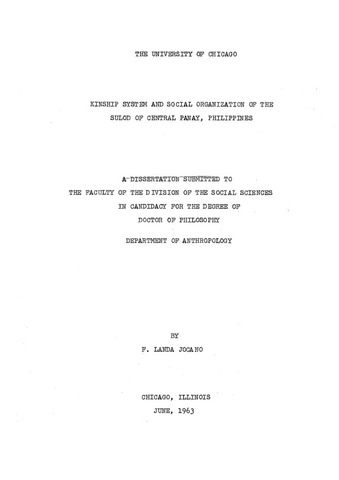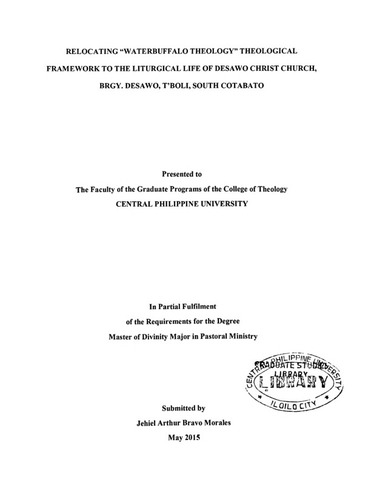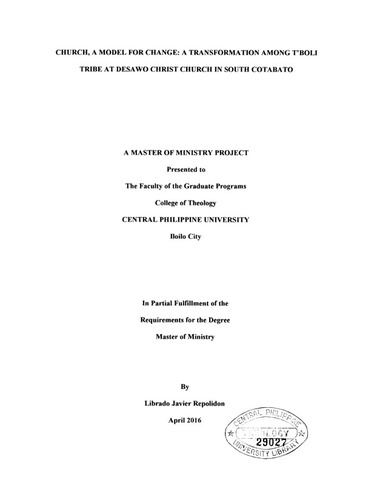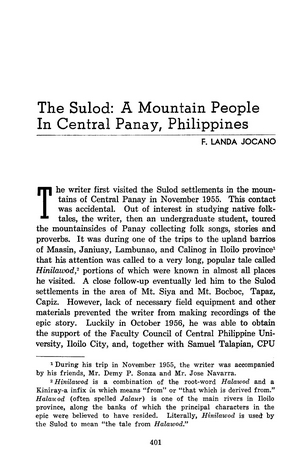Kinship system and social organization of the Sulod of Central Panay, Philippines
요약
The Sulod are a relatively small group of non-Christians inhabiting the banks of Panay River between Mt. Siya and Mt. Baloy in Central Panay, Philippines. Unless otherwise indicated, this essay deals with the social organization of those living in the settlements of Maranat, Siya, Taganghin, Buri, and Takayan. These people number from 800 to 1000. The basis of the economic subsistence is shifting, dry agriculture, called by them kaingin, supplemented with hunting, fishing, and gathering. Despite sporadic contacts with Christian lowlanders, no dramatic social and cultural changes have occurred in Sulod lifeways in recent times. Social life is still characterized by a primary concern with socio-religious activities and a correlative superordination of kinship.
Prior to this study, the Sulod were relatively unknown to students of Filipino society; no similar investigation was attempted in the past. The earliest mention of the Sulod that I have found is in a ten-page typescript term paper submitted by Juan Celeste to Prof. H. O. Beyer, University of the Philippines, in 1912. It appears, however, that Beyer did not take this report seriously for he did not cite it in his book, Population of the Philippine Islands in 1916. He continued to use such broad terms as bukidnon, mundu, and montesses to describe the mountain people of Panay. The latter designation was used by Eugenio Ealdama to describe a group living in Daan Sur and Daan Norte in the municipality of Tapaz, Capiz province, in a series of popular articles published in the Philippine Magazine in 1937 and 1938. Ealdama’s work offered many valuable leads into the culture of Panay's mountain people. However, no similar studies have been made since 1937.
Lack of information makes the position of the Sulod significant not only in understanding the culture history of the central Philippines, but also in providing a starting point for future studies in the Western Bisayas. Moreover, the relative isolation of these people from the rest of the inhabitants of Panay island, due largely to the geographical ruggedness of their territory which discourages frequent lowland contacts, offers an excellent opportunity for a more rigorous and scientific control over observation and analysis of cultural phenomena important in determining the choice of principles of social behavior and the consequent formulation of possible generalizations.
The primary aim of the present study is to examine the nature and function of the social organization of the Sulod. These people possess a complex bilateral social structure. A great deal of anthropological attention has, for many years, been devoted to the study of societies having unilinear social structures while those with bilateral structures have received less attention from ethnographers.
기술
Introduction
추천 인용
Jocano, F. L. (1963). Kinship system and social organization of the Sulod of Central Panay, Philippines (Unpublished Doctoral dissertation). University of Chicago, Illinois.
유형
Dissertation주제
학과
Department of Anthopology정도
Doctor of Philosophy물리적 설명
xiii, 305 pages
Collections
- Dissertations [10]
Related items
Showing items related by title, author, creator and subject.
-
Relocating "Waterbuffalo Theology" theological framework to the liturgical life of Desawo Christ Church, Brgy. Desawo, T'Boli, South Cotabato
Morales, Jehiel Arthur B. (2015)This study sought to relocate “Waterbuffalo Theology” to the worship life of the T’boli in Desawo Christ Church. Particularly, it sought to critically analyze on how Christianity have changed the T’boli people in their ... -
Church, a model for change: A transformation among T’boli tribe at Desawo Christ Church in South Cotabato
Repolidon, Librado Javier (2016)This study attempted to interpret the development of the T’boli people under the care of the Desawo Christ Church in relation to its holistic-oriented program. Specifically, the study aimed to trace the historical development ... -
The Sulod: A mountain people in Central Panay, Philippines
Jocano, F. Landa (Ateneo de Manila University, 1958)The writer first visited the Sulod settlements in the mountains of Central Panay in November 1955. This contact was accidental. Out of interest in studying native folktales, the writer, then an undergraduate student, toured ...





